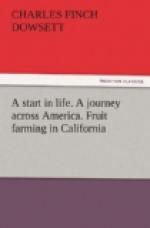their fore paws up; they are very quick, and most
difficult even to shoot. More antelopes and coyotes.
At a station called Alpine were several cowboys, all
armed with revolvers and cartridge belts, and some
with dagger knives too; their mustangs were hitched
up close by. These cowboys are some old and some
young men, some wild and some cultivated, some never
educated, some have gone through Harvard, or Oxford,
or Cambridge, some the sons of English county gentlemen
and noblemen—but all cowboys,
i.e.,
men who live on ranches where large herds of cattle
or horses are bred, and whose duty it is to ride over
the wild rough country to know where the herds of
cattle and horses are feeding, so that if they need
to be ridden up for cutting or branding, or selling,
they may be found. I was told that this was one
of the “hardest” places for a cowboy,
i.e.,
one of the wickedest, meaning that when they visit
it, it is for a “spree,” and they get
drunk, and fights and murders follow. I was pointed
to a little cemetery on a hill, enclosed by a white
fence, and was told that it contained 150 bodies,
and that only 50 had died a natural death; the others
had been shot or otherwise murdered in drunken frays
and other ways. Many strange little histories
were told me about these men, but which I have no
time to record here. In some parts of the country
where water was very scarce, there seemed to be no
vegetation, and the cattle seemed to wander solitarily
along, a mere heap of hide and bone. At many
stations I had quite a considerable interval for running
about, such as when a wheel caught fire, which happened
two or three times, or some freight had to be taken
in, or taken out,
etc. When the train again
starts, the conductors shout “All aboard,”
and there is a general rush.
The next day (December 20th) was again a brilliant
day of sunshine; we see many buzzards, and breakfast
at San Antonio. The railway stations along this
country have two roofs, one being two or three feet
above the other, so that air between should keep the
building cool. At breakfast, I read the San Antonio
Daily Express, which informed me “severe
storms prevailed everywhere in Great Britain,”
and my thoughts were naturally much occupied with
the Old Country. The day was sultry, but sunshine
is always a great treat to me, and it was never too
hot.
Now we are running into civilization again, and I
catch sight of a man ploughing; he has a pair of mules,
and is holding the reins in his teeth. As we
proceed, it is a continuous succession of cotton fields,
cotton fields, cotton fields. We see many bales;
these weigh from 475 to 600 lbs. each. At a station
called Sequin, I obtained lots of cotton seeds, and
gathered some cotton in the fields as we went along.
The scavengers of this country are Turkey buzzards,
which are protected by law because of their usefulness.




